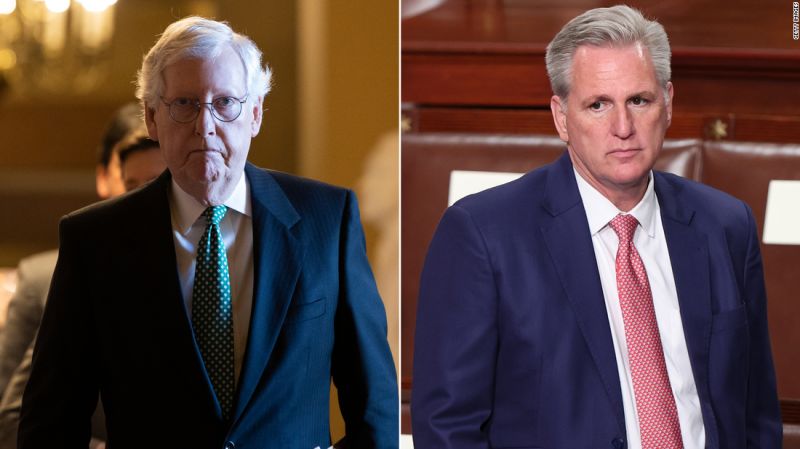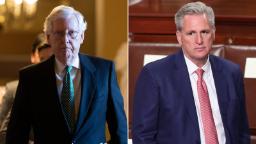

CNN
—
House and Senate Republicans are gearing up for a tense series of closed-door meetings this week as the GOP grapples with what went wrong in the midterms and decides the political fate of its current leaders, who are under fire following last week’s disappointing election results.
With the balance of the House yet to be determined, but a razor-thin majority looking likely, House GOP Leader Kevin McCarthy is staring down a serious revolt from his right flank that could derail his speakership ambitions. Dozens of hardliners are threatening to withhold their support for McCarthy unless he gives in to their demands.
And in the Senate, Senate Minority Leader Mitch McConnell has been calling his colleagues over the last several days to shore up his support as his team plans to plow forward with leadership elections on Wednesday despite grumbling by a faction of dissenters who are trying to slam the brakes after their midterm debacle. They are planning to have a GOP air-clearing session on Tuesday.
McCarthy has also spent the past five days working the phones to solidify support for his speakership bid, and he has spoken to former President Donald Trump multiple times since last Tuesday, according to GOP sources. The former president endorsed McCarthy for speaker the day before the midterm elections – something his allies hope sway his conference’s staunchest Trump supporters.
But Rep. Andy Biggs of Arizona, a former chairman of the pro-Trump House Freedom Caucus, is considering mounting a long-shot challenge to McCarthy during the House GOP’s internal leadership elections on Tuesday, according to GOP sources familiar with the matter. McCarthy’s team has been prepared for this possibility.
While McCarthy is not worried about any challengers and only needs a simple majority during that vote to become the GOP’s speaker nominee – the real test would come in January when he would need 218 votes on the floor – the likely challenge from Biggs could expose how McCarthy is currently short of 218 votes and open up uncomfortable conversations about why an oft-promised “red wave” never materialized.
“We need to have a real discussion about whether he should be the speaker,” Biggs, who was in Washington, DC, last week for House Freedom Caucus meetings, told reporters. “I think we should have a very frank discussion internally about where we’re going to be going forward.”
After Democrats retained control of the Senate – with the possibility of picking up an additional seat in the Georgia runoff race in December – McConnell is facing far more anger in his ranks than previous election cycles, although he still has enough support to secure another term leading his conference.
A small, but vocal, group of GOP senators has been calling to delay their leadership elections so they can have a “family discussion” about why the GOP underperformed. And at least one Republican, Sen. Josh Hawley of Missouri, has publicly vowed to oppose McConnell’s bid for GOP leader.
Both McConnell and McCarthy are moving full steam ahead with their planned leadership elections this week, and the Senate GOP will also meet Tuesday for its weekly closed-door lunch, where the internal blame game is sure to heat up.
Florida Sen. Rick Scott, the chair of the National Republican Senatorial Committee, is among those calling for a delay in the Senate leadership election scheduled for Wednesday, saying it “doesn’t make any sense” to have them this week.
“What is our plan, what are we running on? What do we stand for?” Scott said Sunday on Fox News. “The leadership in the Republican Senate says you cannot have a plan, we’re just gonna run against how bad the Democrats are. And actually they cave into the Democrats. Now they want to rush through an election. We haven’t even finished what’s happened in Georgia.”
It’s a stunning reversal of fortunes – and potential moment of reckoning – for the once-bullish GOP, with party leaders now scrambling to quell the brewing rebellions in their ranks and explain why the election did not go their way. And the disappointing results have scrambled other leadership races as well, with Rep. Tom Emmer of Minnesota – the head of the House GOP’s campaign arm – now facing a tougher time becoming the House GOP whip, a position that will only become available if Republicans indeed capture the majority – still not a guarantee.
“They’ve been measuring the draperies, they’ve been putting forth an agenda. They haven’t won it yet,” Speaker Nancy Pelosi told CNN’s “State of the Union.” “After the election is concluded, depending on who was in the majority, there’ll be judgments made within their own party, in our own parties, as to how we go forward.”
Behind the scenes, the finger pointing has already begun, and those conversations are likely to accelerate as the full House and Senate return to Washington this week for the first time since the midterm elections.
Trump and his allies have tried to make McConnell the fall guy for the GOP’s lackluster midterm performance, accusing McConnell of spending recklessly in states where Republicans faced significant headwinds at the expense of candidates in more competitive contests.
But others in the party have placed the blame squarely on Trump, whose hand-picked candidates failed in key Senate races that determined control of the Senate. Plus McConnell’s super PAC spent more than any other group in Senate races – while Trump’s group spent a tiny fraction of that – a realty not lost on the Kentucky Republican’s allies.
“There’s a very high correlation between MAGA candidates and big losses,” said retiring Pennsylvania Republican Sen. Pat Toomey. “I think my party needs to face the fact that if fealty to Donald Trump is the primary criteria for selecting candidates, we’re probably not going to do really well.”
McConnell and Scott have also been publicly at odds all election cycle when it comes to strategy, with McConnell sounding the alarm about candidate quality while Scott opted to take a hands-off approach in the primaries.
When pressed on whether he would challenge McConnell for the top spot, Scott didn’t rule it out — even though he would have little chance of succeeding.
“A lot of people have called me to see if I’ll run,” Scott said. “Here’s my focus, is we still got to win Georgia. I’m not going to take anything off the table.”
Similar recriminations are taking place across the Capitol, where some House Republicans are questioning their leadership’s embrace of the MAGA wing, lack of a cohesive message on abortion, and decisions to spend precious resources in deep blue territory late in the game.
Still, McCarthy’s allies remain confident he can secure the 218 votes to become speaker in January. He tapped a team of trusted allies to help lock down support, and several would-be challengers – including GOP Reps. Jim Jordan and Steve Scalise – have lined up behind his bid.
While McCarthy has been willing to hear out his critics and the potential hold outs, so far, he is not giving in to any of their demands for more power and promises of investigations into the Biden administration.
GOP lawmakers think McCarthy will wait to see how the internal leadership elections play out before he starts cutting deals with the conservative hardliners. However, even that poses some risks for McCarthy, who also can’t afford to lose any of the lawmakers in the middle.
“Basic political physics says you can’t appease the moderates and HFC all at the same time,” one senior Republican told CNN. “If you straddle that fence, you better hope it’s not barbed wire.”
